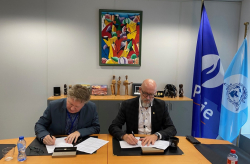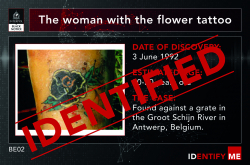LYON, France – A murdered woman has been identified as Rita Roberts after 31 years following Operation Identify Me.
The international appeal was launched in May of this year by Belgian, Dutch and German police, in collaboration with INTERPOL, seeking the public’s help in identifying 22 women believed to have been murdered.
One of those cold cases, known as ‘the woman with the flower tattoo’, dated back to 3 June 1992, when a woman’s body was found against a grate in the water of the river ‘Groot Schijn’ near the Ten Eekhovelei in Antwerp, Belgium. She had been violently killed.
Her most striking physical feature was a flower tattoo on her left forearm of a black flower with green leaves and with ‘R’Nick’ written underneath. For three decades, the victim remained nameless.
How Rita Roberts was identified
The following details have been made public with the agreement of the victim’s family and that of the Antwerp public prosecutor’s office:
- Rita Roberts was 31 when she moved to Antwerp from Cardiff in February 1992.
- She last communicated with her relatives via postcard in May 1992.
- On 10 May of this year, Operation Identify Me was launched, receiving significant coverage and generating some 1,250 tips from the public.
- A family member in the United Kingdom recognized the tattoo on the news and notified INTERPOL and Belgian authorities via the Identify Me appeal web page.
- The family then travelled to meet with investigators in Belgium, and formally identified their missing relative through distinguishing personal identifiers.
- Thereafter, the Antwerp family court was petitioned to have the victim’s death certificate amended to reflect her identity.
The family of Rita Roberts said in a statement:
“The news was shocking and heartbreaking. Our passionate, loving and free-spirited sister was cruelly taken away. There are no words to truly express the grief we felt at that time, and still feel today.
“Whilst the news has been difficult to process, we are incredibly grateful to have uncovered what happened to Rita. We miss her deeply but are thankful for the excellent support and care of Belgium Missing Persons, Antwerp Police, INTERPOL and Durham Police in the UK. This cross-border collaboration has given a missing girl back her identity, and enabled the family to know she is at rest.
“Rita was a beautiful person who adored travelling. She loved her family, especially her nephews and nieces, and always wanted to have a family of her own. She had the ability to light up a room, and wherever she went, she was the life and soul of the party. We hope that wherever she is now, she is at peace.”
The family have asked for the media not to contact them during their grieving process.
Now that her identity is known, Belgian authorities are calling on the public for any information they may have on Rita Roberts or the circumstances surrounding her death. This can be submitted via an online form on INTERPOL’s website.
“We congratulate the authorities in Belgium, Germany and The Netherlands for their leadership in Operation Identify Me. Its important work continues.”
INTERPOL’s Black Notices
Operation Identify Me was the first time INTERPOL released public extracts from Black Notices. These are used to seek information on unidentified bodies and to determine the circumstances surrounding the death.
Black Notices can include information on the location where the body was found, biometric information (DNA, fingerprints, facial images), dental charts, physical descriptions of the body or clothing, and any other details relevant to identifying the deceased.
Since 2021, INTERPOL has been providing investigators with a new global tool, the I-Familia database. It has already solved cases by helping identify unknown bodies through international family DNA kinship matching. Such cases draw on the voluntary DNA contributions made by relatives of the missing, and underline the role played by the public and partners when it comes to identifying missing persons.
Identify Me appeal
The work of Operation Identify Me continues. Members of the public, particularly those who remember a missing friend or family member, are invited to consult www.INTERPOL.int/IM and contact both INTERPOL and the relevant national police team should they have any information on any of the cases.
For biological relatives who believe one of the deceased women could be their missing loved one, national police once contacted can liaise with INTERPOL for international DNA comparison.
Contact forms are at the bottom of each online case summary.
Countries involved
Related news

Breakthrough in longstanding Dutch missing person case
11 October 2024









